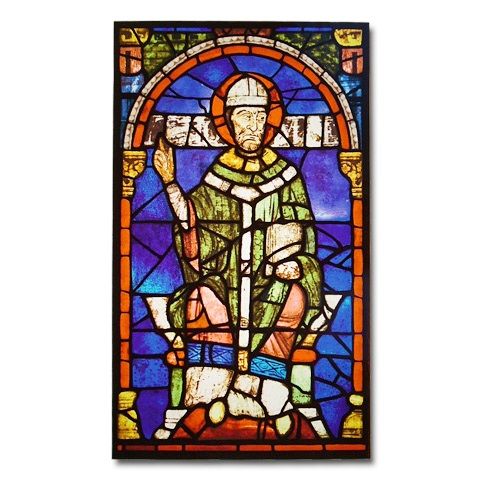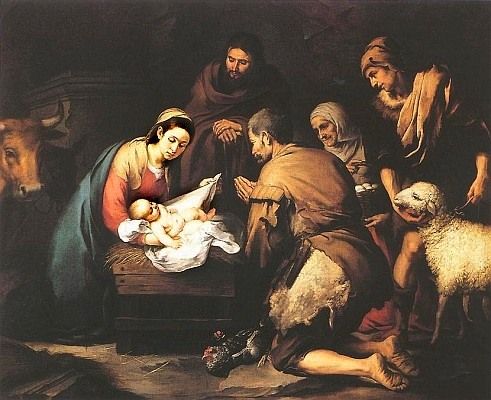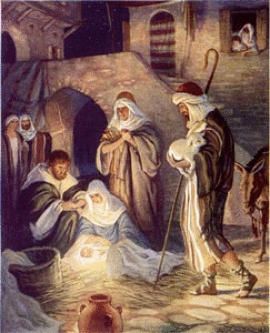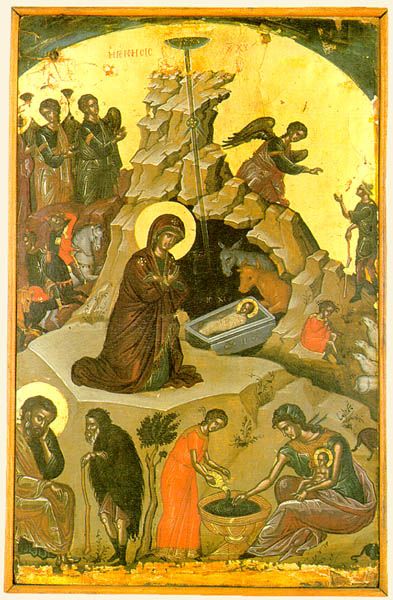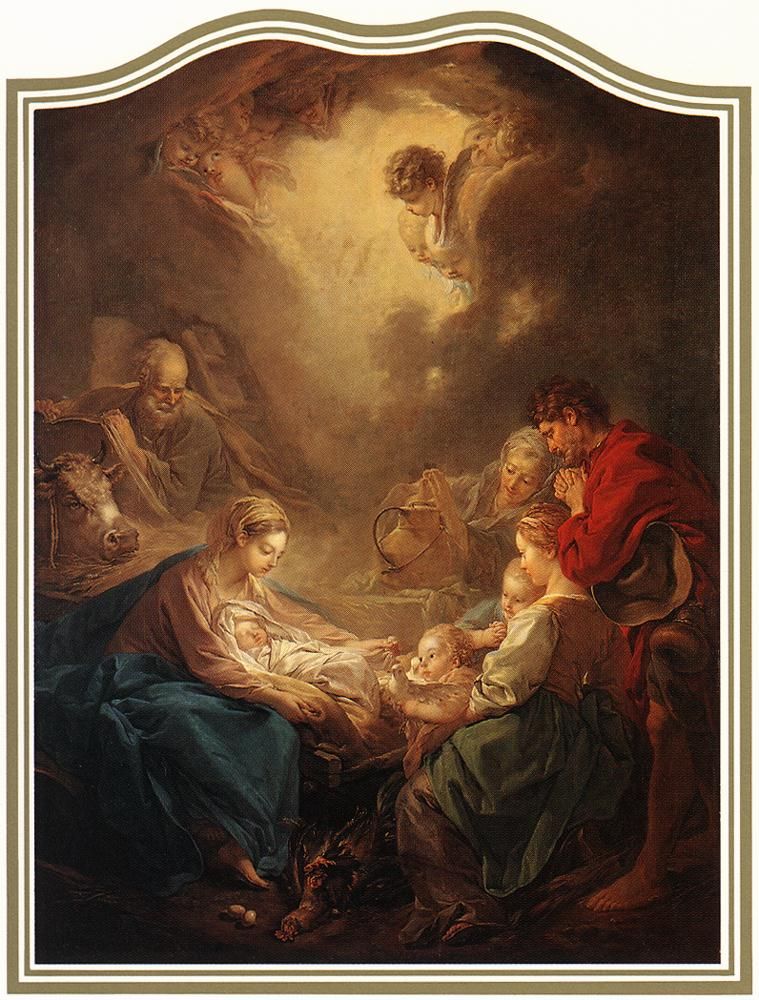Today, December 29, we celebrate the feast day of Saint Thomas Becket (Thomas á Becket , 1117-1173), Archbishop of Canterbury, and martyr of the Church. Saint Thomas withstood pressures from King Henry II, defending the sanctity and sovereignty of the Church. His life is a study in steadfastness and courage, from which we draw inspiration.
Below, a sermon preached by the Archbishop of Canterbury on Christmas Morning, 1170. During this Christmas season, we read these words, spoken over 800 years ago with the same joy and wonder with which they were delivered!
THE ARCHBISHOP preaches in the Cathedral on Christmas Morning, 1170
'Glory to God in the highest, and on earth peace, good will toward men.' The fourteenth verse of the second chapter of the Gospel according to Saint Luke. In the Name of the Father, and of the Son, and of the Holy Ghost. Amen.
Dear children of God, my sermon this morning will be a very short one. I wish only that you should ponder and meditate the deep meaning and mystery of our masses of Christmas Day. For whenever Mass is said, we re-enact the Passion and Death of Our Lord; and on this Christmas Day we do this in celebration of His Birth. So that at the same moment we rejoice in His coming for the salvation of men, and offer again to God His Body and Blood in sacrifice, oblation and satisfaction for the sins of the whole world. It was in this same night that has just passed, that a multitude of the heavenly host appeared before the shepherds at Bethlehem, saying, 'Glory to God in the highest, and on earth peace, good will toward men'; at this same time of all the year that we celebrate at once the Birth of Our Lord and His Passion and Death upon the Cross. Beloved, as the World sees, this is to behave in a strange fashion. For who in the World will both mourn and rejoice at once and for the same reason? For either joy will be overborne by mourning, or mourning will be cast out by joy; so it is only in these our Christian mysteries that we can rejoice and mourn at once for the same reason. 'But think for a while on the meaning of this word 'peace.' Does it seem strange to you that the angels should have announced Peace, when ceaselessly the world has been stricken with War and the fear of War? Does it seem to you that the angelic voices were mistaken, and that the promise was a disappointment and a cheat?
Reflect now, how Our Lord Himself spoke of Peace. He said to His disciples 'My peace I leave with you, my peace I give unto you.' Did He mean peace as we think of it: the kingdom of England at peace with its neighbours, the barons at peace with the King, the householder counting over his peaceful gains, the swept hearth, his best wine for a friend at the table, his wife singing to the children? Those men His disciples knew no such things: they went forth to journey afar, to suffer by land and sea, to know torture, imprisonment, disappointment, to suffer death by martyrdom. What then did He mean? If you ask that, remember then that He said also, 'Not as the world gives, give I unto you.' So then, He gave to His disciples peace, but not peace as the world gives.
Consider also one thing of which you have probably never thought. Not only do we at the feast of Christmas celebrate at once Our Lord's Birth and His Death: but on the next day we celebrate the martyrdom of His first martyr, the blessed Stephen. Is it an accident, do you think, that the day of the first martyr follows immediately the day of the Birth of Christ? By no means. Just as we rejoice and mourn at once, in the Birth and in the Passion of Our Lord; so also, in a smaller figure, we both rejoice and mourn in the death of martyrs. We mourn, for the sins of the world that has martyred them; we rejoice, that another soul is numbered among the Saints in Heaven, for the glory of God and for the salvation of men.
Beloved, we do not think of a martyr simply as a good Christian who has been killed because he is a Christian: for that would be solely to mourn. We do not think of him simply as a good Christian who has been elevated to the company of the Saints: for that would be simply to rejoice: and neither our mourning nor our rejoicing is as the world's is. A Christian martyrdom is no accident. Saints are not made by accident. Still less is a Christian martyrdom the effect of a man's will to become a Saint, as a man by willing and contriving may become a ruler of men. Ambition fortifies the will of man to become ruler over other men: it operates with deception, cajolery, and violence, it is the action of impurity upon impurity. Not so in Heaven. A martyr, a saint, is always made by the design of God, for His love of men, to warn them and to lead them, to bring them back to His ways. A martyrdom is never the design of man; for the true martyr is he who has become the instrument of God, who has lost his will in the will of God, not lost it but found it, for he has found freedom in submission to God. The martyr no longer desires anything for himself, not even the glory of martyrdom. So thus as on earth the Church mourns and rejoices at once, in a fashion that the world cannot understand; so in Heaven the Saints are most high, having made themselves most low, seeing themselves not as we see them, but in the light of the Godhead from which they draw their being.
I have spoken to you today, dear children of God, of the martyrs of the past, asking you to remember especially our martyr of Canterbury, the blessed Archbishop Elphege; because it is fitting, on Christ's birth day, to remember what is that Peace which He brought; and because, dear children, I do not think I shall ever preach to you again; and because it is possible that in a short time you may have yet another martyr, and that one perhaps not the last. I would have you keep in your hearts these words that I say, and think of them at another time. In the Name of the Father, and o£ the Son, and of the Holy Ghost. Amen.
Why pray the Rosary every day for a year?
Each time the Blessed Virgin has appeared-- whether it be to Saint Bernadette Soubirous at Lourdes; to Lucia, Jacinta, and Francisco at Fatima; or to Mariette Beco at Banneux-- she has asserted the importance, saving grace, and power of praying the Holy Rosary on a daily basis. Based upon her words, the Rosary is penance and conversion for sinners, a pathway to peace, an end to war, and a powerful act of faith in Jesus Christ. Pope Paul VI presented the Rosary as a powerful means to reach Christ "not merely with Mary but indeed, insofar as this is possible to us, in the same way as Mary, who is certainly the one who thought about Him more than anyone else has ever done."
To show us how this is done, perhaps no one has been more eloquent than the great Cardinal Newman, who wrote: "The great power of the Rosary consists in the fact that it translates the Creed into Prayer. Of course, the Creed is already in a certain sense a prayer and a great act of homage towards God, but the Rosary brings us to meditate again on the great truth of His life and death, and brings this truth close to our hearts. Even Christians, although they know God, usually fear rather than love Him. The strength of the Rosary lies in the particular manner in which it considers these mysteries, since all our thinking about Christ is intertwined with the thought of His Mother, in the relations between Mother and Son; the Holy Family is presented to us, the home in which God lived His infinite love."
As Mary said at Fatima, "Jesus wants to use you to make Me known and loved. He wishes to establish the devotion to My Immaculate Heart throughout the world. I promise salvation to whoever embraces it; these souls will be dear to God, like flowers put by Me to adorn his throne."







